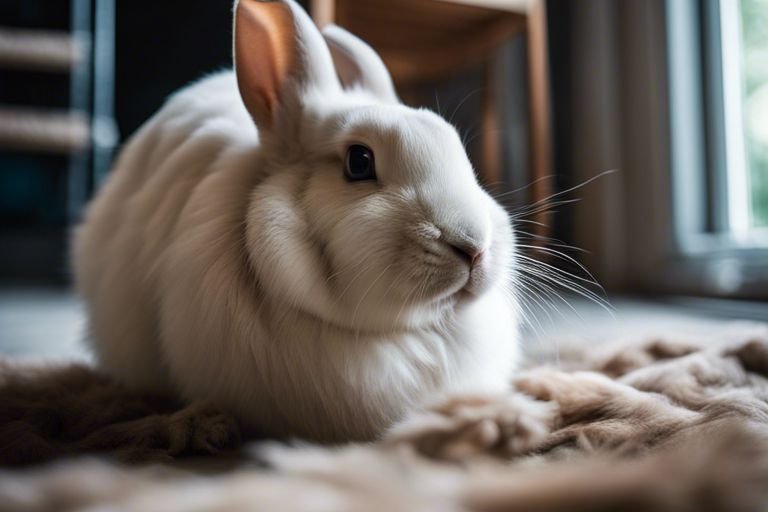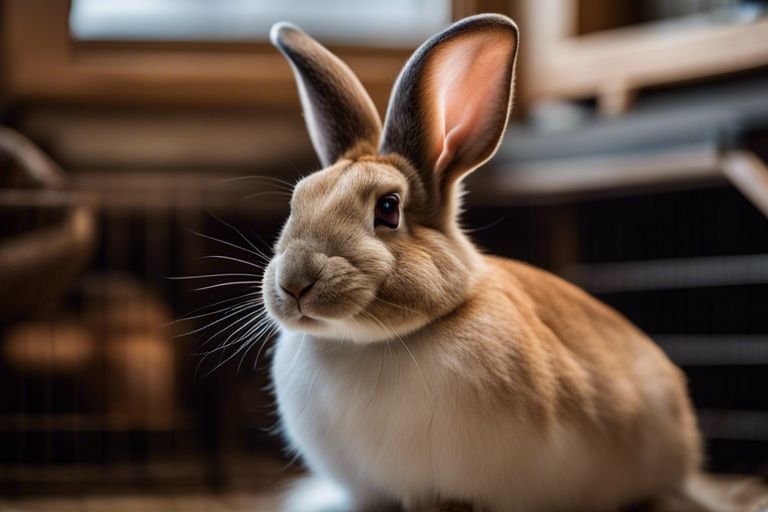During molting or shedding, unlike many other rabbit breeds, Flemish Giants exhibit unique behaviors that you should be aware of to ensure their health and well-being. Understanding these common behaviors can help you provide the best care for your Flemish Giant during this natural process. From excessive grooming to changes in appetite, it is important to recognize these signs and know how to properly manage them.
Key Takeaways:
- Increased grooming: Flemish Giants will often exhibit increased grooming behavior during molting or shedding to help remove loose hair and promote new hair growth.
- Reduced activity: During the molting process, Flemish Giants may show signs of reduced activity and energy levels as their bodies focus on regenerating new fur.
- Loss of appetite: It’s common for Flemish Giants to have a decreased appetite during molting, as their bodies prioritize the energy needed for the shedding process.
- Scratching or rubbing against objects: To alleviate any discomfort from shedding, Flemish Giants may frequently scratch or rub against objects to help remove loose fur and alleviate itching.
- Increased sensitivity to touch: During molting, Flemish Giants may become more sensitive to touch as their skin may be more exposed and tender due to shedding.
Flemish Giants: Temperament and Socialization
Now that you understand the molting process of Flemish Giants, it’s important to discuss how their temperament and socialization may be affected during this time. Understanding these factors can help you better care for your rabbit and ensure their well-being. If you want to learn more about fur loss and skin problems in domestic rabbits, you can check out this resource.
Temperament Traits During Shedding
During shedding, Flemish Giants may exhibit some changes in their behavior. The discomfort from shedding can make them irritable, and they may be more prone to bouts of aggression or frustration. It’s essential to be patient and understanding during this time and provide them with the care and comfort they need. Be mindful of handling them gently and avoiding sudden movements that may startle them.
Socialization Needs in Molting Periods
When Flemish Giants are molting, they may seek more solitude and may not be as receptive to socialization. However, it’s crucial to continue to interact with them and maintain their socialization to prevent them from becoming withdrawn or stressed. Try to engage them in gentle play or grooming sessions to ensure they maintain a sense of security and companionship.
Physical and Dietary Considerations
Obviously, maintaining your Flemish Giant’s physical and dietary needs during molting is crucial to ensure their health and well-being. This period of shedding can be physically taxing for your rabbit, so it’s important to pay close attention to their size, strength, and energy levels, as well as their nutritional needs and grooming habits.
Size, Strength, and Energy Levels During Molting
During molting, your Flemish Giant may experience a decrease in energy levels and strength due to the physical stress of shedding their old fur and growing in new fur. It’s important to monitor their weight and ensure they are consuming enough nutrients to support their body’s needs during this time. You may notice your rabbit being more lethargic or less active than usual, which is normal during this phase. However, if you notice a significant decline in their size or strength, it’s important to consult with a veterinarian to address any potential health concerns.
Nutritional Needs and Grooming During Shedding
It’s essential to ensure that your Flemish Giant is receiving a balanced and nutritious diet during shedding to support their body’s increased demands for growth and repair. Make sure to provide them with plenty of fresh hay, leafy greens, and high-quality rabbit pellets to support their nutritional needs. Additionally, regular grooming to help remove loose fur and prevent matting is important to support their overall health and well-being during this time. Pay attention to any changes in their grooming habits or appetite, and make necessary adjustments to their diet and grooming routine to ensure they are receiving the best care possible.
By paying close attention to the size, strength, and energy levels of your Flemish Giant, as well as their nutritional needs and grooming habits during shedding, you can ensure that they are well-equipped to handle this natural process. Remember, your rabbit’s health and well-being are in your hands, so taking proactive measures to support them through molting is crucial. Keep a close eye on their physical and dietary needs, and don’t hesitate to seek professional advice if you have any concerns about their health during this time. With proper care and attention, your Flemish Giant can come out of shedding season healthy and happy.

Behavioral Patterns and Training
Despite their typically gentle nature, Flemish Giants may exhibit changes in behavior during molting or shedding. It is important to understand their behavioral patterns and how to effectively train them during this time to maintain a harmonious relationship.
Obedience Training Challenges When Molting
When your Flemish Giant is molting, you may encounter challenges with obedience training. The discomfort and irritability associated with shedding may cause your pet to be more resistant to commands and less focused during training sessions. It’s crucial to recognize these challenges and approach training with patience and understanding.
Positive Reinforcement and Alternative Training Methods
During molting, it is essential to shift your training approach to focus on positive reinforcement and alternative methods. Offer your rabbit plenty of time to groom themselves, as this is a natural behavior during shedding. Utilize treats or favorite toys as rewards for desired behaviors, and consider implementing clicker training or other positive reinforcement techniques to maintain their engagement and motivation. Additionally, you may explore alternative training methods such as agility courses or interactive games to keep your Flemish Giant mentally stimulated during this challenging time.
Health Care and Maintenance
To ensure that your Flemish Giant remains healthy during the shedding process, it is important to take proactive measures in their health care and maintenance. This includes regular veterinary check-ups, parasite prevention, and proper grooming techniques.
Veterinary Check-ups and Vaccinations
Regular veterinary check-ups are essential for maintaining your Flemish Giant’s overall health, especially during molting. Your veterinarian can assess any potential health issues and provide necessary vaccinations to keep your bunny protected. Make sure to follow their recommended vaccination schedule to ensure your bunny is well-protected against common diseases.
Parasite Prevention and Grooming During Shedding
During shedding, it is crucial to be diligent about parasite prevention and grooming. Fleas, ticks, and mites can cause discomfort and health issues for your bunny, so be sure to use vet-recommended products to prevent these pests. Additionally, regular grooming to remove loose fur and prevent matting will help your Flemish Giant stay comfortable and healthy during molting.
FAQ
Q: What are some common behaviors exhibited by Flemish Giants during molting or shedding?
A: During molting or shedding, Flemish Giants may exhibit behaviors such as increased grooming, scratching, and shedding of fur. They may also experience decreased appetite and energy levels as their bodies focus on regenerating new fur.
Q: How can I help my Flemish Giant during molting or shedding?
A: To help your Flemish Giant during molting or shedding, you can provide regular grooming to remove loose fur and minimize discomfort. Additionally, ensuring a balanced diet and providing extra nutrition such as supplements can support their overall health during this time.
Q: Are there any warning signs to watch for during molting or shedding in Flemish Giants?
A: Warning signs to watch for during molting or shedding in Flemish Giants include excessive scratching or hair loss, which may indicate an underlying issue such as skin irritation or mites. Additionally, a significant decrease in appetite or energy levels could signal a more serious health concern and should be addressed by a veterinarian.
